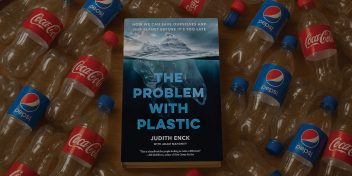For most people, climate change is something to worry about along with the economy, race relations, government debt, gun violence, etc. The media is filled with conflicting stories and the Rs and Dems disagree. It’s hard to know what to think. In 2023 we know it’s a bit warmer outside and the fires, floods, droughts and hurricanes seem worse. But is it really worth a massively expensive clean energy transition? Most people think not.
That’s the question we asked ourselves four years ago. We had a deep legal and financial background and yet we realized we didn’t know about climate change. Like almost all of you, we never took a course on climate change. Our focus after school years was on making a living and taking care of the family. When we started, we hoped this was indeed the crazy leftwing fad many had painted it as. Who the heck needs a supposedly “existential” problem (def: having to do with existence itself) like climate change on top of all the other stuff. And, we had to decide to worry for our kids and grandkids because we’ll be past 90 in 2047.
We had to run down 4 elements of climate change before we became convinced.
1. The Basic Science: Scientists have been saying for over 100 years that adding CO2 and other greenhouse gases to the atmosphere would block infrared heat from leaving the earth’s surface. Scientists were predicting as early as the 19th Century that burning fossil fuels would increase the concentration of CO2 in the atmosphere and that we could experience, in time, temperature increases of 3 to 5 degrees Centigrade.
2. The Progression: 150 years ago the CO2 concentration was 280 parts per million and today it’s 420 ppm. While a rise of only 140 ppm doesn’t seem like a big deal, it is. In 2023 we are putting 34 billion tons of CO2 per year into the atmosphere (not counting other greenhouse gases). In 1950, the figure was 6 billion and in 1990 it was 22 billion. The relevant section of the atmosphere is only 7.5 miles thick. Each year, we are adding 2.25 ppm of CO2 concentration to the atmosphere. At the rate we’re going, in forty years we’ll be over 500 ppm.
3. The Impacts: The best projections of sea level rise, droughts, etc. are based on complex computer modeling. The idea that monumental impacts are just decades away appears likely. In fact, the scientists, for fear of criticism, may have been too conservative. Earth was a very stable system for 10,000 years. In a hundred years, we’ve thrown it way out of whack. Our near-term worry is an intense and long-lasting heat wave in a heavily populated region that knocks out the grid leaving millions of people without fuel, AC or fresh water for weeks or months.
4. The Solutions: Unless you realize THERE ARE NOT any magic bullet solutions, you’ll remain a skeptic. Just a decade ago, the thinking was we could get away with JUST rapidly cutting emissions from the grid, vehicles, buildings and industry. Now, we’re pretty sure we’ll ALSO have to do massive direct air carbon capture and other extreme measures. Just planting a billion trees and a massive nuclear build out (fusion or otherwise) won’t even come close.
In short, you can’t discover the truth unless you dig in yourself. A clue: Almost every nation and company on the planet has pledged to get to net zero by 2050 (even China by 2060).




